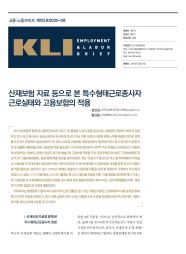한국노동연구원 'KLI Employment & Labor Brief'에 대한 설명 입니다.
KLI Employment & Labor Brief
KLI Employment & Labor Brief

KLI Employment & Labor Brief No. 102 (2020-09): Dependent Self-Employed Contractors: Evaluating Working Conditions and Employment Insurance Coverage Based on Workers’ Compensation Insurance Data
- Author Insong Jang and Sunoong Hwang
- Publication Date 2020.12.15
- Length 8
- ISBN
Content
Table of Contents
I. Analyzing the Current Status of Dependent Self-Employed Contractors Based on Workers’ Compensation Insurance DB
II. Dependent Self-Employed Contractor: Hires, Separations and Seniority
III. Expanding Coverage of Employment Insurance
IV. Implications
Summary
With the advent of the 4th Industrial Revolution, diversification of employment types has been taking place rapidly, evidenced by those in special types of employment (hereinafter referred to as “dependent self-employed contractors”) and platform workers. Dependent self-employed contractors, similar to wage workers, receive earnings by providing labor services to businesses in order to sustain a living on wages, but are excluded from receiving employment insurance because they are not considered as wage workers.
The need to expand employment insurance
coverage to dependent self-employed contractors to ensure stable livelihoods
and smooth reemployment had been discussed as a major social agenda from the
mid-2000s but had not achieved any legislative success. The Moon Jae-in
administration presented extending the national employment insurance program to
dependent self-employed contractors and artists as a major task, and has been
preparing for its implementation through setting up “The Task Force for
Employment Insurance System Improvement” and “The Employment Insurance Committee.”
In addition, as the recent COVID-19 pandemic has further increased social
consensus about the need to address the difficulties of vulnerable groups such
as dependent self-employed contractors and to eliminate employment insurance
blind spots, there are growing calls for providing employment insurance
coverage for dependent self-employed contractors through the revision of the
Employment Insurance Act. In May 2020, an amendment to the law for putting
artists under employment insurance coverage passed the National Assembly
(Promulgated on June 9, Scheduled to take effect on Dec 10), and in September
2020, partial amendments to the Employment Insurance Act (Bill No. 3779) and
the Act on the Collection of Insurance Premiums, etc. for Employment Insurance and
Workers’ Compensation Insurance (Bill No. 3803) were submitted to the National
Assembly as government legislation.
This paper will discuss the main characteristics of dependent self-employed contractors by analyzing the workers’ compensation insurance DB, which is the only data source containing information about the working conditions of dependent self-employed contractors. Also, by examining the survey results on dependent self-employed contractors, this paper will also analyze several additional characteristics related to the eligibility criteria for employment insurance in case it is expanded to include dependent self-employed contractors.
 Source Indication + Commercial Use Prohibition + Change Prohibition
Source Indication + Commercial Use Prohibition + Change Prohibition